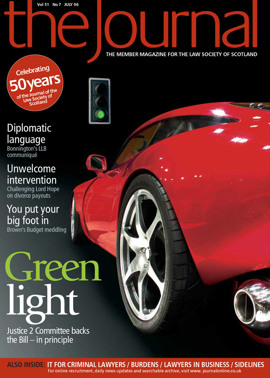A block on service

In October 2003 SLAB introduced a block fee system for civil legal aid. The impact this had on family law practitioners was immediate.
Before the change all solicitors who were registered for legal aid were invited to re-register and although many did, it soon became apparent that family lawyers were often either restricting the amount of legal aid work they did or not undertaking such work at all.
The main concern was that the block fee system would not adequately remunerate practitioners for the amount of work required to be undertaken in family law cases. Like myself, many family lawyers whose caseload was predominantly legal aid work were not in a position simply to turn away that work. Initially we hoped for a “swings and roundabouts” effect, balancing the less demanding cases against high maintenance cases. Experience has not borne this out.
As Vice Chair of the Family Law Association and also a member of our legal aid sub-committee, I have been inundated with calls from members frustrated and upset to discover that a file they spent a great deal of time on, and where they achieved a good result for their client, has resulted in a very small fee. Such is the frustration that many firms have decided to undertake legal aid work no longer.
I am aware from FLA members that it is extremely difficult to find a solicitor in Edinburgh who will undertake a family law case on a legal aid basis. Numerous firms outwith the cities have also decided they are not prepared to do so. Although many of these solicitors are registered with SLAB, in reality many of them no longer undertake legal aid work in family law cases. Even in a town like Paisley there are at least three firms in this position. The FLA has had various consultations with SLAB, who have undertaken to look at the difficulties. As yet nothing has changed and even if changes do take place these will not be retrospective.
As family law practitioners are aware, very few cases are simple. Most are complicated factually and often involve complex legal argument. In addition, we are often dealing with people who are highly stressed and who require not only legal advice but additional guidance when their marriage/relationship ends. When such cases also involve domestic abuse and child-related issues, the time spent on a particular file increases immensely. For most family lawyers “high maintenance” clients are the norm rather than the exception.
The impact the block fee system has had is that those who do undertake legal aid work have found that although their caseload may have increased (usually because of referrals from other solicitors who no longer undertake such work), their fee income has decreased quite significantly. Unlike criminal legal aid work where the block fee can be remunerative, family cases invariably involve numerous meetings and protracted correspondence with clients and the other solicitor.
The reality of the block fee system is that whether you see a client once or 100 times the fee is the same. This has led to frustration and de-motivation among family law practitioners. The impact on clients is that their choice of solicitor is restricted. In many cases experienced family law solicitors simply do not undertake legal aid work any more. Often clients have difficulty finding a solicitor in their home town, and when they do find representation many discover that although they may see an experienced solicitor for the initial meeting the case is then referred to someone more junior, as the reality is that a partner or senior solicitor simply cannot undertake legal aid work profitably.
The experience of most family law practitioners is that the block fee system is restrictive and does not adequately remunerate them for the work they undertake. This has an impact not only on the fee income of solicitors but also the availability of quality legal representation for those who require the assistance of legal aid in matters of extreme importance to them. My fear and indeed the fear of many family law practitioners is that as more firms realise that it is simply not profitable to undertake legal aid work in this area, cases will increasingly be handled by less experienced solicitors, which will undoubtedly impact on both the quality of the service to the client and the quality of cases being presented to the courts. Solicitors who undertake such work are instrumental in resolving complex family situations to the benefit of clients, their children and indeed spouses. To have cases dealt with by experienced family law practitioners is a service not only to their clients but to society as a whole. Forcing such solicitors to limit or cease legal aid work is a loss to the profession and the people of Scotland.
In this issue
- Challenging times
- A block on service
- Revving up for debate
- LLB confidential
- Clean break under attack
- The hokey-cokey Chancellor
- Switching channels
- The Chancellor gets it REIT
- Executries sponsored feature
- The EU and the criminal
- Case for the defence
- To act or not to act... that is the question!
- A summary matter
- Ireland 4, Italy 0
- The route ahead
- Scottish Solicitors Discipline Tribunal
- Website reviews
- Book reviews
- Is that burden dead yet?






